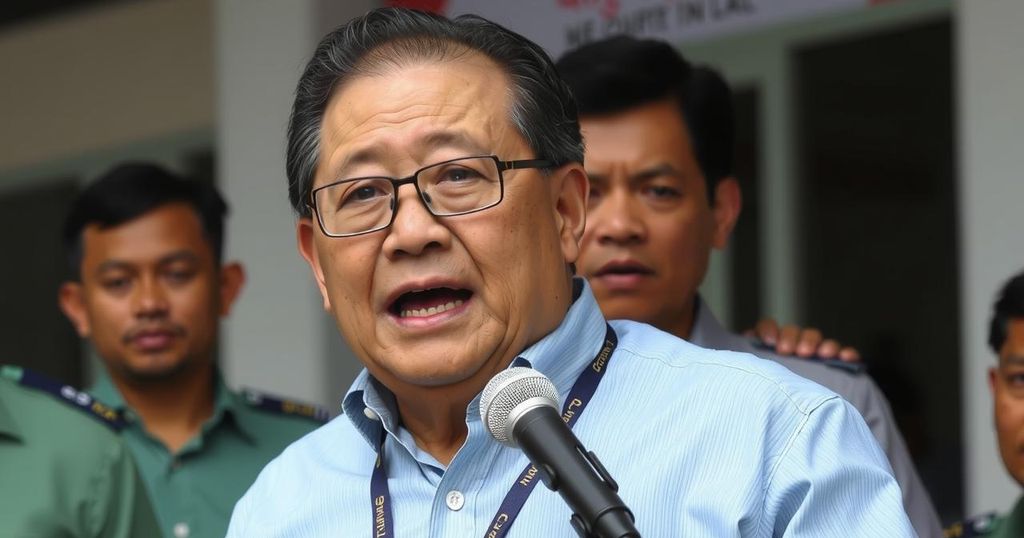Lim Kimya, a Cambodian opposition politician and critic of the government, was assassinated in Bangkok, underscoring the risks faced by political dissidents. Known for his vocal opposition to corruption and human rights abuses, Lim Kimya’s death raises concerns about the safety of activists and the climate of fear surrounding Cambodian politics.
On January 3, 2023, Lim Kimya, a prominent Cambodian opposition politician and critic of the government, was tragically shot dead in Bangkok. A former member of the Cambodia National Rescue Party (CNRP), Lim Kimya was known for his unwavering stance against corruption and human rights abuses. Despite the personal risks involved, he continued to vocalize his criticisms against the ruling Cambodian People’s Party (CPP), even in the face of violence aimed at silencing dissenters. His assassination underscores the increasing threats faced by opposition figures in Cambodia and the risks of voicing opposition abroad.
The shooting occurred near the Wat Bowonniwet Vihara temple in Bangkok shortly after Lim Kimya’s arrival from Cambodia. Surveillance footage captured the attack, and a suspect was arrested in Battambang, Cambodia, shortly thereafter. While the Cambodian government disavowed any connection to the killing, asserting that it cannot be held accountable for incidents on foreign soil, the implications of this event resonate deeply within the realm of Cambodian politics, particularly for activists and politicians in exile.
Lim Kimya’s political journey began as a member of the CNRP, where he initially gained significant recognition by winning a seat in the 2013 elections. His criticisms included calling out apparent favoritism in humanitarian aid, which he attributed to the leadership of Prime Minister Hun Sen’s wife at the Cambodian Red Cross. Notably, during a National Assembly discussion, Lim Kimya stated, “The Cambodian Red Cross is biased in helping people who are affected by disasters.”
Having lived and worked in France before returning to Cambodia in 2012, Lim Kimya became a vocal advocate within his party, even after the CNRP was disbanded in 2017. He remained active on social media, posting allegations against the ruling government’s mismanagement and nepotism, especially criticizing Hun Sen’s family members who occupy prominent government roles.
His assassination represents a significant turning point and is emblematic of the increasing dangers for Cambodian opposition figures, particularly those seeking asylum or expressing dissent in neighboring countries, such as Thailand. Activists and observers have reported a rise in threats and attacks against dissenters, which casts a long shadow on the prospects for free speech and democracy within Cambodia.
Lim Kimya’s untimely death reiterates the importance of protecting the rights of political dissenters in Cambodia, as well as the broader implications for global human rights advocacy in the context of authoritarian regimes. The violence against Lim reflects a concerning trend of silencing opposition through lethal means, which could hinder democratic processes not only in Cambodia but also across the region.
The recent assassination of Lim Kimya, a notable Cambodian opposition figure, has brought to light the treacherous environment political dissidents face in Cambodia and abroad. His relentless fight against the ruling Cambodian People’s Party (CPP), particularly regarding corruption and human rights issues, positions him as a symbol of resistance against authoritarianism. Historically, opposition parties in Cambodia, like the CNRP, have encountered significant repression, particularly after the party was dissolved ahead of the 2018 elections, which underscores the climate of fear permeating Cambodian politics. Lim Kimya’s return from France to engage in Cambodian politics further accentuates the dynamics between exiled critics and the threats they continue to face from their home government, even outside of Cambodia’s borders.
In summary, the assassination of Lim Kimya highlights the perils faced by opposition figures in Cambodia. Despite being a dual citizen and residing in a neighboring country, Lim Kimya remained an outspoken critic of the government until his tragic death. His legacy serves as a reminder of the ongoing struggle for democratic principles and human rights in Cambodia, where dissent is increasingly met with violence and intimidation. The international community must remain vigilant and support efforts to uphold human rights and political freedom in the region.
Original Source: www.rfa.org






